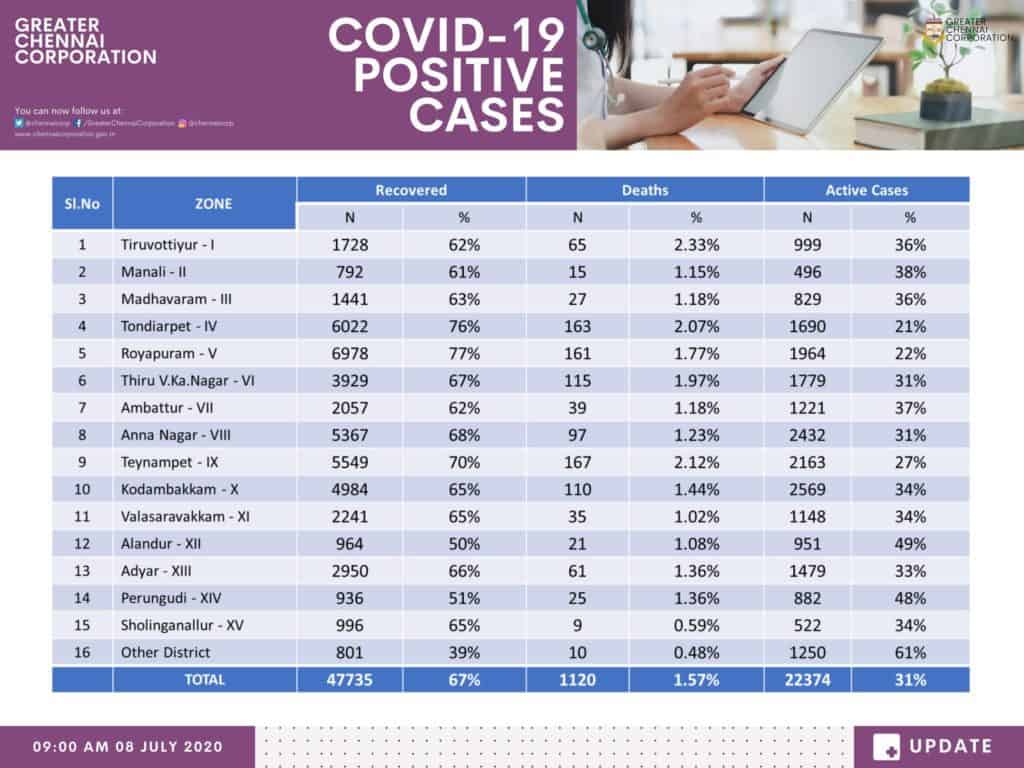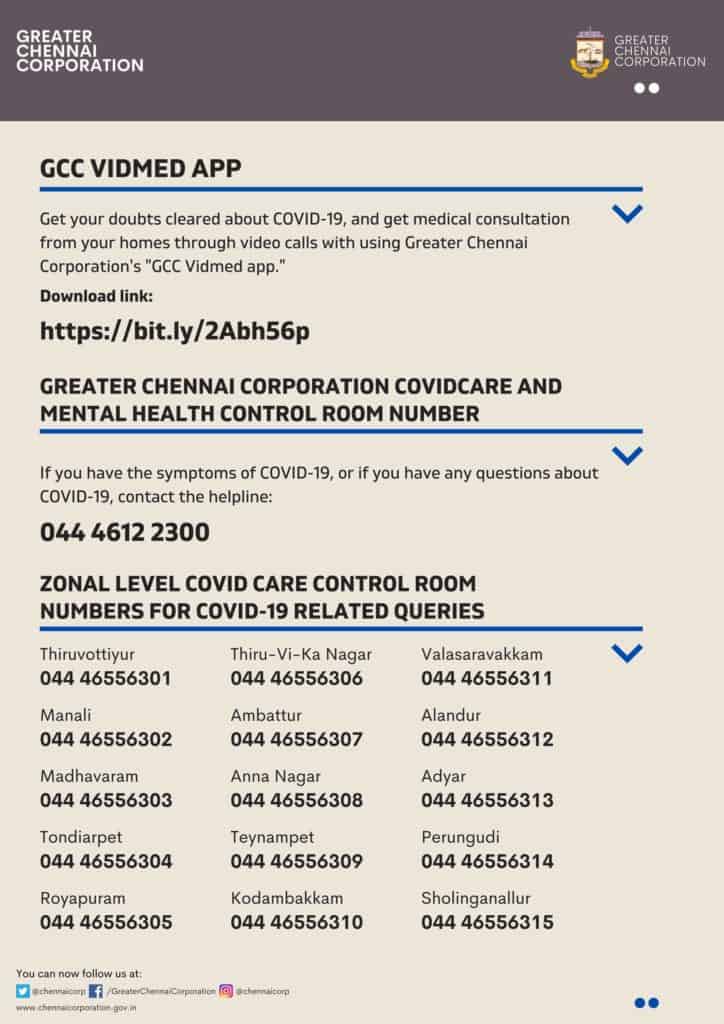With around 25,000 positive cases, the city of Chennai has not yet flattened the COVID curve. As more and more people are affected by the virus, the basic questions around getting a test done and choosing the right hospital still remain unanswered for many. The result: as soon as the tests return positive, panic grips the patient and their family members, and they are left struggling in the absence of proper information.
“Many of the COVID -19 deaths in Chennai are due to the lack of treatment at the right time. This is a crucial time for every citizen to identify the symptoms of the virus and undergo treatment without delay,” said medical superintendent of Stanley Medical College and Hospital, Dr K Dhanasekaram.
Considering the importance of authentic information about the virus and the disease, here is a step-by-step guide to help you, in case you show symptoms of COVID-19.
Precautions and testing
- Common early symptoms of the disease include: Cough, Fever, Shortness of breath, Sore throat, Congestion, Headaches, Body Aches, Sudden loss of smell and taste, commonly reported by recent COVID patients. However, some asymptomatic patients may not experience any of these.
- Whether you are a frontline worker in close contact with known COVID-19, or an asymptomatic person, buy an oximeter to measure oxygen levels in the blood every day. An oxygen saturation level of 95 per cent is considered normal for most healthy individuals. An oxygen saturation level lesser than that 90% is considered to be worrisome and calls for immediate medical attention.
- Get a swab test done from any of the ICMR accredited laboratories if you have symptoms of COVID-19. Though the new ICMR rule says you can get a test even without a prescription, many laboratories in the city are yet to follow it. In a private lab, you have to spend anywhere between Rs 4000 to Rs 6000 to get the swab test. Get the list of ICMR-accredited laboratories here.
- Testing can also be done at the fever clinics being conducted by GCC in all the zones. Click here to identify the clinic nearest to you.
- The results will reach your mail inbox within 48 hours of the swab. If the result is positive, it will also reach the concerned corporation official in your zone.
I’m positive! Home isolation or hospital?
Home isolation for 14 days is recommended by the treating medical officer to a person if
- He/ she comes in contact with a COVID-positive patient. It is vital to monitor the temperature during this period.
- When a citizen is COVID-positive but asymptomatic.
- When the patient has mild symptoms such as cold, cough, fever, diarrhoea and headache.
- If the patient has no comorbidities such as Hypertension, Diabetes, Heart disease, Chronic lung/liver/kidney disease etc.
Elderly patients aged more than 60 years and those with co-morbid conditions may be asked to isolate themselves at home, but only after a thorough evaluation by the medical officer.
The caretaker should monitor the health of the patient regularly and the patient should be hospitalised if the symptoms turn severe (such as difficulty in breathing, dip in oxygen saturation to lower than 90%, persistent pain/ pressure in chest and discolouration of lips/ face.)
When a COVID patient has recovered and is back home. He/she will be isolated and symptoms will be monitored to ensure the person is cured.
A minimum of two rooms with attached bathrooms and a caretaker is a must for home isolation. If your home is not conducive, get in touch with the Corporation official who will suggest a COVID Care Centre (for example, educational institutions and hotels) in your vicinity.
Source: Ministry of Health and Family Welfare
Keep the kit ready
Before moving to a Covid Care Centre or a hospital, keep the kit of documents and other essentials ready.
- Essentials: Clothes, mobile, laptop, charger, debit cards, oximeter, facemasks, thermometer, toiletry and sanitation kit, water bottle, electric kettle and hand sanitisers
- Documents: Insurance details, medical history files, list of allergies.
Source: Citizen Matters Bengaluru
Hospitalisation basics
- Choose the nearest government hospital and check bed availability. If there is no response from the government agencies, call up the Corporation official in your zone (chart below)
- You can contact the concerned GCC official from your zone (check the chart below) to enquire about the government hospitals. GCC will also send a doctor home to check the seriousness of the viral infection.
- If you want to opt for a private hospital, call them beforehand and check for bed availability. Here is a list of private hospitals and their contacts.
- It costs about Rs 2 -3 lakh in an average private hospital (higher in some hospitals) for the seven day COVID treatment package
- If you have medical insurance, there is a high chance that your treatment is covered in it. Here are the most important things you should know about insurance policies that cover COVID treatment.
- The patient should go to the hospital (government or private) in an ambulance only. Call the helpline number 108 to call an ambulance. If you have chosen the private hospital, the authorities will send home an ambulance.
- Please note that most hospitals won’t allow a family member or any attendant to stay with the infected person due to the risk of spread.

Credits: Greater Chennai Corporation
- If you are in home isolation, a health worker from GCC will check your health status every day either personally, or through a phone call. Do not hide any details as it will affect the assessment.
- Provide the details of all the people you were in contact with. Contacts are persons who have been exposed to a confirmed case anytime between two days prior to onset of symptoms and the date of isolation (or a maximum of 14 days after the onset of symptoms)
Imperative to inform
- The family members of the patient should immediately contact the concerned Corporation official (check zonal level contacts in chart above) who would arrange for swab tests of all those who have been in contact with the infected person
- The official will also give the contact of a police officer or FOCUS (Friend of COVID Citizen Under Surveillance) volunteer who will provide groceries and other necessities to the family, as they should all be home quarantined.
- The Corporation official will also send a sanitary worker to disinfect the house scientifically.
- It is also necessary to immediately inform the President/ Secretary of the resident welfare association if you are staying in an apartment complex.
Treatment and discharge
- Mild cases: Discharge after 10 days of symptom onset and no fever for three days.
- Moderate cases: If the fever is resolved within three days and oxygen saturation is maintained without support, a patient can be discharged after 10 days of symptoms onset. Ability to maintain oxygen saturation for 3 consecutive days is the deciding factor.
- Severe cases: Besides the symptoms of dipping oxygen saturation levels and breathlessness, immunocompromised patients (those with HIV, transplant recipients and malignancy) come under the severe category. They are discharged only after the patient tests negative once by RT-PCR test.
(Source: Department of Health and Family Welfare, Tamil Nadu government)
Resources
- It is normal to feel anxious, confused or sad during a crisis. Talk to the people you trust to ease your emotions. You can also contact GCC tele-counselling centre for psychosocial support: 044 46122300
- Helpline number for assistance during home isolation: 044 25384520


Beautiful information…excellent..thanks
Excellent. This will help tide over crisis to a large extent.
Vary useful information. Thank you soo much ???
Excellent. Very useful information
Super thanq for information
Excellent guidance thank you
Extremely useful and very well written. Thank you ?
Excellent Information to Common Public
Thank you very much for all the information and details. It also removes doubts and anxiety. May God bless you.
Valuable information. Thanks
Useful information.
Very helpful …thanks a lot for the information
Excellent information. I am sure it will build confidence in the mind of panic stricken citizen who have terrible fear.
Really very useful information as most of them become very anxious and confused on what to do next on testing positive.
It is a clear guide when people are in confused state. Thanks for the valuable information.
Is it true that goverment officials will allow you back to home only if you get a covid negative, even after 15 days of stay in Hospital?